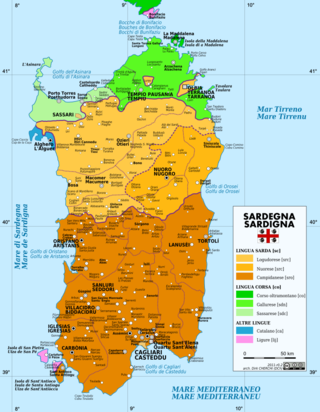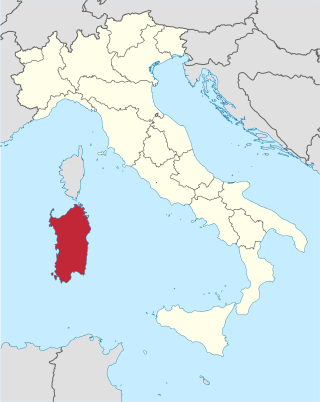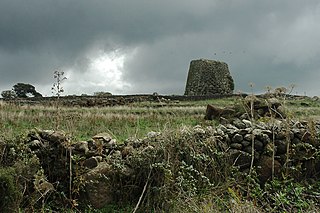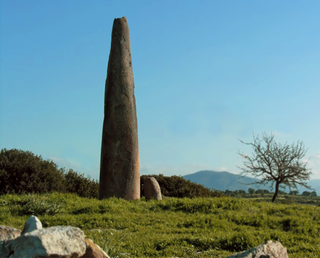
Corsican is a Romance language consisting of the continuum of the Italo-Dalmatian dialects spoken on the Mediterranean island of Corsica (France) and on the northern end of the island of Sardinia (Italy). Corsican is related to the varieties of Tuscan from the Italian peninsula, and therefore also to the Florentine-based standard Italian.

Gallurese is a Romance dialect of the Italo-Dalmatian family spoken in the region of Gallura, northeastern Sardinia. Gallurese is variously described as a distinct southern dialect of Corsican or transitional language of the dialect continuum between Corsican and Sardinian. "Gallurese International Day" takes place each year in Palau (Sardinia) with the participation of orators from other areas, including Corsica.

Sardinia is the second-largest island in the Mediterranean Sea, after Sicily, and one of the twenty regions of Italy. It is located west of the Italian Peninsula, north of Tunisia and immediately south of the French island of Corsica.

Sassarese is an Italo-Dalmatian language and transitional variety between Sardinian and Corsican. It is regarded as a Corso–Sardinian language because of Sassari's historic ties with Tuscany and geographical proximity to Corsica. Despite the robust Sardinian influences, it still keeps its Corsican roots, which closely relate it to Gallurese; the latter is linguistically considered a Corsican dialect despite its geographical location, although this claim is a matter of controversy. It has several similarities to the Italian language, and in particular to the old Italian dialects from Tuscany.

The Ligurian language was spoken in pre-Roman times and into the Roman era by an ancient people of north-western Italy and current south-eastern France known as the Ligures.

The Province of Sardinia and Corsica was an ancient Roman province including the islands of Sardinia and Corsica.

The Corsicans are a Romance Italic ethnic group. They are native to Corsica, a Mediterranean island and a territorial collectivity of France.

The Corsi were an ancient people of Sardinia and Corsica, to which they gave the name, as well as one of the three major groups among which the ancient Sardinians considered themselves divided. Noted by Ptolemy, they dwelt at the extreme north-east of Sardinia, in the region today known as Gallura, near the Tibulati and immediately north of the Coracenses.

The prehistory of Corsica is analogous to the prehistories of the other islands in the Mediterranean Sea, such as Sicily, Sardinia, Malta and Cyprus, which could only be accessed by boat and featured cultures that were to some degree insular; that is, modified from the traditional Paleolithic, Mesolithic, Neolithic and Chalcolithic of European prehistoric cultures. The islands of the Aegean Sea and Crete early developed Bronze Age civilizations and are accordingly usually treated under those categories. Stone Age Crete however shares some of the features of the prehistoric Mediterranean islands.

The Nuragic civilization, also known as the Nuragic culture, was a civilization or culture on the Mediterranean island of Sardinia, Italy, which lasted from the 18th century BC up to the Roman colonization in 238 BC. Others date the culture as lasting at least until the 2nd century AD and in some areas, namely the Barbagia, to the 6th century AD or possibly even to the 11th century AD.

The Torrean civilization was a Bronze Age megalithic civilization that developed in Southern Corsica, mostly concentrated south of Ajaccio, during the second half of the second millennium BC.

The Sardinians, or Sards, are a Romance language-speaking ethnic group native to Sardinia, from which the western Mediterranean island and autonomous region of Italy derives its name.

Paleo-Sardinian, also known as Proto-Sardinian or Nuragic, is an extinct language, or perhaps set of languages, spoken on the Mediterranean island of Sardinia by the ancient Sardinian population during the Nuragic era. Starting from the Roman conquest with the establishment of a specific province, a process of language shift took place, wherein Latin came slowly to be the only language spoken by the islanders. Paleo-Sardinian is thought to have left traces in the island's onomastics as well as toponyms, which appear to preserve grammatical suffixes, and a number of words in the modern Sardinian language.
The Balares were one of the three major groups among which the Nuragic Sardinians considered themselves divided.

The Pre-Nuragic period refers to the prehistory of Sardinia from the Paleolithic until the middle Bronze Age, when the Nuragic civilization flourished on the island.

Hampsicora was a Sardo-Punic political leader and landowner of Sardinia, and the leader of the major anti-Roman revolt in the province of 215 BC.
The Roman-Sardinian Wars were a series of conflicts which took place in Sardinia in a span of time between the 3rd century BC and the 1st century AD. These wars involved the Romans against the major indigenous tribes which inhabited Sardinia: the Ilienses, the Balares and the Corsi of Sardinia. The struggle against Sardinians in order to maintain control of the coastal cities occupied a significant part of the efforts of the Roman Republic and the Roman Empire.

Sardinian surnames are surnames with origins from the Sardinian language or a long, identifiable tradition on the Western Mediterranean island of Sardinia.


















